Cinematic Puppetry
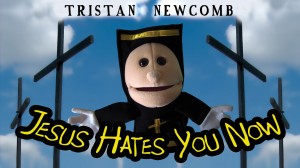
SOMEHOW I happened across Jesus Hates You Now, a 78-minute video-experience of cult de-programming, puppet insanity, and bizarre genius on the part of the project's creator artist/filmmaker/puppeteer/actor Tristan Newcomb. Please note, I'm a very cynical reviewer and harsh media critic. I don't throw around the word "genius" often -- maybe ever. But this experience, perhaps it's a "movie" (I don't know exactly what to call it), this thing, Jesus Hate You Now, is a profound work of art. I watched it straight through, with an expression of disbelief on my face, my jaw agape, and the overwhelming feeling that this could be the strangest thing I'd ever seen. At first I thought I was watching some kind of documentary on cults. But I knew there were puppets in it, so that seemed weird. But wait, bring on the LSD, the blasphemous puppet diatribes, the penis mutilation, the hallucinatory special effects and music, the threat of being turned into a sack of human remains -- what the hell was I watching? It was... amazing. And it included so many crazy and elaborate mini stories, such well crafted editing and effects, and these perfectly delivered monologues -- delivered by either a puppet or by Tristan as he portrays the lead human figure in the story -- the cult deprogrammer. These monologues, which become the entire dialogue for this film, are the absolute best part of all the films that I've now seen by Tristan and Lumalin Productions. His poetic, heart wrenching, insane monologues (that flow as if off-the-cuff), and his spot-on acting have melted this cynical reviewer and harsh media critic's heart.
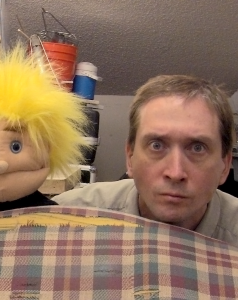
What follows is an interview with Tristan Newcomb (T.N.) and Interviewer Katherine Sweetman (K.S.)
K.S. I'd like to think I've seen some pretty strange "movies" in my days -- experimental films, internet porn, video art projects, etc. But I'm not exaggerating when I say Jesus Hates You Now is one of the strangest things I've ever seen in my whole life. What was the impetus behind creating this "movie"? Can I call it a movie?
T.N. Yes, it's definitely a movie - I always fight to keep the whole thing from drifting into pure anarchy. I make sure to fuse a narrative spine down the middle, because anarchy feels like it would just be too easy. Whatever didn't work, you'd chalk it up to breaking the rules. But nothing's easier than rule-breaking in cinema. So I always try to have a central character who's utterly sincere, and isn't being insane or funny, just very sincerely otherly-minded, as an anchor to the proceedings. I love the anti-hero protagonists who aren't just thugs or rebels, like Dr. Herbert West in the Re-Animator movies. He wasn't mad or even entirely misguided, he's just trapped in a severe difference of opinion with the world - and can never see the world as his intellectual or scientific equal. I had always wanted to do a cult deprogramming movie, after seeing Ticket to Heaven long ago. But I couldn't do anything that had any content overlap with Ticket to Heaven. That movie has been so plundered, as well as the Moonie cult it's based on. There's a whole cartload of cult tropes now: the ranch or farm location, the sleep deprivation, the gradual malnutrition, the brainwashing through zealous chanting. Even The Simpsons had an episode with all that. I couldn't touch any of it. The only common item is when I make mention that there's a Korean Reverend behind it all - which is a Moonie riff, of course. But I've used puppets in other films, so I thought, what if my deprogrammer used abusive puppetry? Could I get a proper Ticket to Heaven meets Jim Henson blend, but completely reverse expectations on both?
K.S. Without giving away major plot points, can you tell me a little bit about Jesus Hates You Now?
T.N. Usually, the cult deprogrammers in movies work directly with the family. They have the cultist sequestered in a room in the family house, only a mattress on the floor, no sharp objects around, no ways to escape, and then they just try drilling the cultist with facts, usually about the cult's criminal background and nefarious intent and such. So I flipped that entire paradigm on its head. It's everything that you would expect a cultist deprogramming NOT to be. Without giving away too much, let's just say my deprogrammer character is a big B.F. Skinner fan, and he was also a birthday party puppeteer in Austria - though he's from the states. I couldn't give him an accent because the Dr. Gavin H. Grant character was already in the last movie, There Was Once a Bitter Bastard. And you can't really do puppet-based torture scenes with a human effecting a German-sounding accent without inducing terrible flashbacks of the Mel Brooks scene in The Muppet Movie. Nearly everyone's watched The Muppet Movie at least once in their life, so it's still all up there in the synapses, including Mel Brooks torturing Miss Piggy with spittle and bad jokes. I'm sure everyone would have felt, hmmmm, there's something familiar about this...
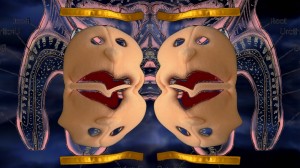
K.S. So many questions spinning in my brain: white rabbit, the farmhouse, PENIS MUTATIONAL. But let me first go with this one first because you mentioned your "last movie", how many feature length puppet films have you made?
T.N. I've done four....Sword of Digestive Calmness, Only Interstellar Pinball Lives Forever, Summer of the Chew Toy Soul, and Jesus Hates You Now. And two that were non-puppet, GRRF: The Sound of Suicide Postponement, and There Was Once a Bitter Bastard. And about 40-50 shorts before that, mostly puppet flavored.
K.S. Wow. So this is an obsession -- I mean ... as all worth while art should be. That's true devotion and time commitment. Your production quality is really nice. I mean cinematography, sound design, music, narration, effects, etc., they are all done really nicely. And from what I gather you do about 99% of it on your own, is that right?
T.N. Can't thank you enough - that's so damn good to hear, you have no idea. Or maybe you do. Yeah, it gets rather novelist these days. It's so single-person-in-solitude now with indie digital. It's like Proust writing his massive novel in his bedroom. That much removed from the world outside. I made a rough calculation once, and each of the feature-length flicks takes between 1000-1250 hours. And over half that number is spent editing and post-producing. Writing and rewriting is the other big chunk. Actually shooting is the most anxiety-fueled and exhausting part, but it takes only a fraction of the time. So that ratio still holds over from studio movies, it seems. But I think you're right, the obsession has to be there with existential puppet cinema. There's no putting on puppets and goofing with friends, no improv, very few times you even break a smile. To get these existential puppet flicks to look like cinema, real visual-craft cinema, it takes a stream of continuous, caffeinated concentration, and if you're really enjoying yourself then something's wrong. It's like Henson, but without the camaraderie or money or playful characters. God, I need a drink....
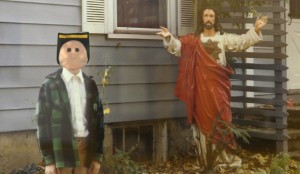
K.S. I guess I should ask, why puppets? When did you start using them and what's the reason for casting in your films -- rather than using humans?
T.N. At first, doing short films with puppets was just a way to be experimental, trying to make them seem serious in bizarre situations. Then it became a sort of niche to aim at, deadpan puppet movies with strange philosophies. And then it became entirely necessary over an eight month shoot to generally use puppets. The feature-length movies just took too long. I still would have used puppets, I think - but I can never really know. Human participants on a zero-budget shoot that goes on for months, it's like herding cats. Having people flake adds such bitterness to the whole thing. There's no money coming from anywhere to smooth over anything, or to keep anyone attached. The problem is, once you go puppet, it's hard to go back. They become addicting in their vesselness, like animation characters. You can say what you want, how you want, whenever you want - and people generally like puppets, although they don't take them seriously, which is the barrier. You can't blame anyone for that, after so much Henson for so long. Frank Oz ended up working with some amazing actors, but he's probably The One.
K.S. Can I ask why you are (now) invested in the feature-length format? It seems like you're giving the middle finger to so many other constraints in film making. Why not abandon the feature and do something, I don't know, 5 minutes or 5 hours?
T.N. When you settle down to do something feature-length, you live with it for so long, you unearth so many more tangential ideas. You get to forge all sorts of wild chains of cause and effect. When you do a short, the finish line is right there. You can see its final form pretty clearly. But doing feature-length, the finish line is usually so far off, you can choose so many crazy paths to get there. I tend to write, shoot, and post-produce my movies roughly ten minutes at a time. It's like Tetris filmmaking. Always changing the next piece based on what the shape of the last piece turned out to be - which can be so different than the script. But if I went off into the land of five-hour movies, the temptation to chop it up into episodes would be irresistible. I couldn't sit on 90 minutes worth of movie while I finished up the other 210, I'd go mad. It was enough agony just to break away from doing shorts. And anything over two hours and I'd have all these alarm bells in my head that I'm being way too self-indulgent. I mean, what would a five-hour Spalding Gray monologue have been like? Anything over an hour is already such a lot to ask of someone, when you think about it. Unless you're a series with a bunch of great writers keeping you going. If they ever stop doing Peep Show, I'm going into mourning.
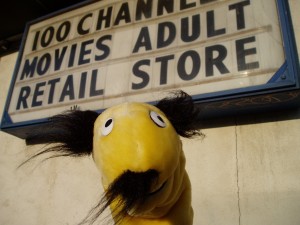
K.S. What's next for you? Are you already on the next project?
T.N. Yup. Shooting the first scenes in about a week. Another oblivious-sociopath rags-to-rags story, utilizing a modified banana slug puppet from UC Santa Cruz. -- Keep up with Tristan and his puppets at Lumalin productions
No comments:
Post a Comment